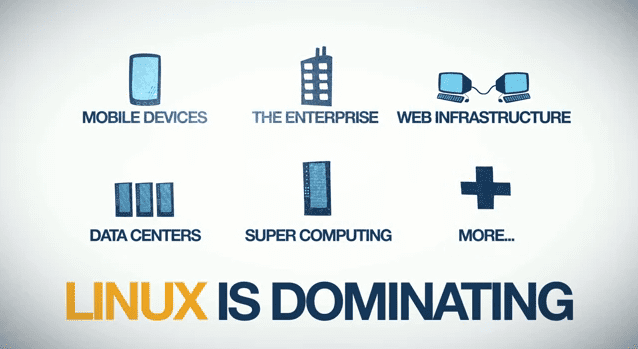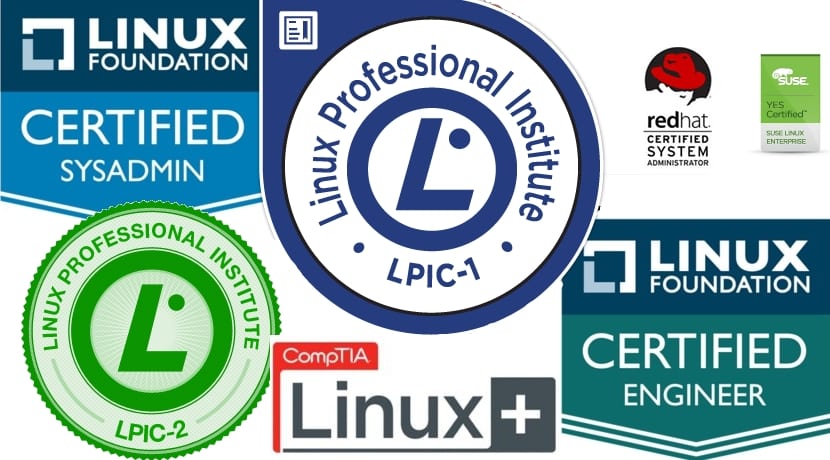
There are many ways to collaborate with the free software community and open source, from writing articles or manuals, translating software, developing, etc. And the best thing is that in this great community you are not one more as you could be in other places, but you are one of us. Open source is reigning and systems with the Linux kernel have become without delay the most used and demanded in the world, despite the fact that many only think that they only have it installed 'some radicals who try to steal secrets from the government' or 'a bunch of geeks'.
If you have been following us, we have written many articles in LxA talking about many projects that are supported by Linux, and there are many companies that need this kernel. That's why it has morphed from something only shared by some computer hobbyists in the early 90's to something monstrous that you should know if you need to improve your job position or if you want to find a job more quickly. That is why in this article we are going to talk a little about its importance, the official certifications that you can take and that are most valued by the IT sector and also how you can start learning ...
Linux in numbers: knowing about jobs

Become a sysadmin (system administrator) specialized in GNU / Linux operating systems or in a developer can be a good opportunity to find a great job. Linux is not a little used system, on the contrary Linux is everywhere. You do not believe it? Well, look around you. If you have access to a supercomputer or a large server, like the ones in the server farm in the image on the cover of this article, you will find that here Windows and macOS are conspicuous by their absence and the great king is Linux and to a lesser extent other Unix. Voucher! You have convinced me, maybe you can think that this type of machine is unattainable for many mortals like us ... or maybe if you become a good sysadmin one day you will have one of them in charge ...
Maybe you smarttv, smartphone or tablet and even your smartwatch have a Linux kernel if you are running an Android OS, Tizen, etc. And what about your car? If you have a connected car, most likely it also has a Linux-based operating system like Android and even if it is not a connected car, many also have electronic systems embedded with Linux-based SoCs for traction control, consumption, security, etc. It is also present in the world of motorsport, the Formula 1 also have them in their electronic control unit and also in the factories where these cars are designed ... The IoT devices so fashionable at the moment, from toys to any other type of device can also work thanks to Linux. And the robots? Well, you are also right, drones and domestic robots such as industrial and scientific robots like those used at NASA also work with Linux and ROS.
Probably yes you have home automation devices at home they also work thanks to Linux, and what about your appliances, many of them also work thanks to it. Maybe you don't have it installed on your laptop or desktop computer or maybe you do, but every day you access Internet services that are supported thanks to GNU / Linux machines such as Google Cloud, Amazon Web Services (AWS), Microsoft Azure, etc. Dont do it? So you have probably seen movies like the ones from Pixar studios that are rendered thanks to Linux machines or maybe you have seen Avatar, Spiderman, etc. Truth?

But ... Do you want more data to think about than Linux It is a profession of the present and of the future? Okay non-conformist, I like it that way so you can take a look at this other article… All those companies dependent on these systems and all manufacturers of Linux-based devices need workers who master the use of this system. You still have doubts, then you can access employment websites or apps and use the keyword Linux, the number of positions that need Linux knowledge will surprise you. When people were laid off in other sectors during the crisis period, many companies needed people trained with Linux knowledge.
Did you know that?
9 out of 10 sysadmins work full time with annual salaries that can exceed € 21.000 per year.
Since 2013 the demand for Linux professionals has been increasing 4% per year, with figures close to the 27% estimated for 2020. Present and future! Remember it.
And best of all, the current demand for qualified professionals is not 100% satisfied, that is, more professionals are needed than are currently trained.
Maybe you thought that you wish Work from home, as this is something that also plays in favor of open source and Linux, since many developers and professionals work from home as remote system administrators, developing software and making contributions or as deskhelp ...
What exams accredit me as a professional?

It is true that there are many certifications available in the market but not all of them are so well valued, so here I will try to guide you in the most truthful way possible and without deception. Many may tell you that passing the first two exams to get the LPIC-1 certifications can catapult you to dream jobs, but the truth is that it does not. That certification is too basic, although there is another even more essential that I do not even recommend. To be able to choose a good job and dedicate yourself to what you like, you need at least have the LPIC-2 and the like.
There are also the official certifications that it presents you SUSE or Red Hat. Personally, I see them quite good and of quality, but if you want advice it is not what you are looking for either, since they are very specific for their ecosystems and not to be able to use GNU / Linux with any distribution in a more generic way. Nor do I see very appropriate to have CompTIA Linux +, well, let me explain ... Yes, it is a fairly well recognized certification and behind it is CompTIA, which has a lot of prestige, but after all, Linux + is the same as LPIC-1. That is, you can go to any authorized center in your area to perform one or the other and the certificate you get is the same in both cases. But as I said in the previous paragraph, I would recommend at least adding the LPIC-2 to this as well, since that level is high enough to be a good sysadmin.
And finally we have the Linux Foundation's own certifications, that you can do it online by connecting your computer with one of the distributions that they require to take the exam (Ubuntu, CentOS or openSUSE). In all of them you will have to pay, of course, both those of LPI and CompTIA, etc., and the Linux Foundation is no exception. But in this case you can choose to get the LFCS, which is the most basic, although quite advanced and equivalent to what we have with LPIC, and on the other hand, the most advanced for development, such as the LFCE.
En conclusion, I would recommend that you opt for both those of the Linux Foundation and those of LPIC (at least up to the LPIC-2), although if you dare and want to go further you can get the LPIC-3 in one of its specialties: security, virtualization, ... With them you will have an official certificate valued by the companies that will make your CV much juicier.
Where can I study to prepare for these exams?

Now, prepare for these exams, especially for the more advanced, it is not an easy task. Basic knowledge is not enough for you, but that does not mean that it is impossible to achieve or that you cannot. Anyone could apply for them. The bad news is that there is not much study material for these certifications that is worthwhile. And if it exists, a lot is not translated into Spanish, but rather books or courses in English or other languages. Then how do i prepare?
Well the truth is that there are some good study materials that I recommend and all of them in Spanish:
- Books:
- For LPIC-1
- For LPIC-2
- For the LPIC-3: you will not find anything specific.
- For other certifications: there are no specific books.
- Courses:
- C2GL: It is a course that prepares you for several certifications in one go, such as the LPIC-1, LPIC-2 and also for the LFCS and LFCE, as well as CompTIA (of course) and it even has parts of the course that can serve you as preparation for certain parts or LPIC-3 exams. It consists of theory PDFs (with input from industry VIPs like Jon "maddog" Hall, Richard Stallman, and more), virtual machines for practice, source code files, and how-to videos. You can check your knowledge with practical tests after each thematic block and with practical challenges that will motivate you to investigate as you learn. I invite you to join! It is also taught online and from any country ...
- Google: It is another of your allies, you can also look for information to learn on your own, although for more essential certifications it could be enough, it may not be the best method for others.
Conclusion, the books have somewhat outdated information, since certifications such as LPIC tend to update every few years, and you may find things somewhat out of date. On the other hand, being self-taught gives you more freedom and is free, but with the course you will always have at your disposal a tutor willing to answer your questions and who can advise you at all times, in addition to having a job bag to choose from.
Do not forget to leave your comments with your doubts, recommendations, or suggestions ...